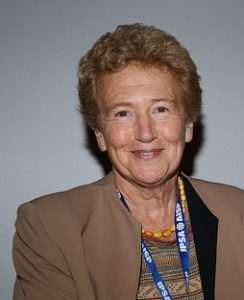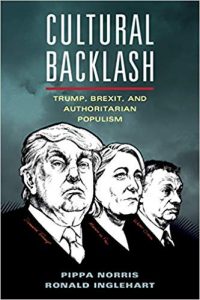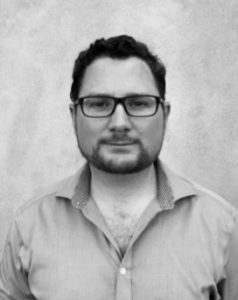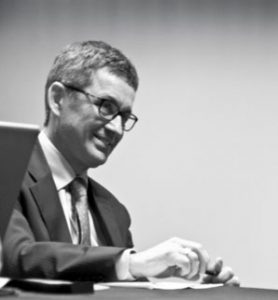le portail de la science politique française
le portail de la science politique française
Quatre Conférences seront organisées en juillet 2019 à Sciences Po Bordeaux, dont une qui mettra à l’honneur Pippa Norris. Ces conférences permettront de traiter des grandes questions de notre discipline, qu’il s’agisse des évolutions du comparatisme dans le monde contemporain ou du développement des études africaines. Une conférence « grand public » sera également consacrée à l’Union européenne après les élections de mai 2019.
 Le mardi 2 juillet de 17h00 à 18h00, Pippa Norris donnera une conférence intitulée « Cultural Backlash: Brexit, Trump and the Rise of Authoritarian Populism ».
Le mardi 2 juillet de 17h00 à 18h00, Pippa Norris donnera une conférence intitulée « Cultural Backlash: Brexit, Trump and the Rise of Authoritarian Populism ».
Pippa Norris is the Paul F. McGuire Lecturer in Comparative Politics at the John F. Kennedy School of Government, Harvard University, ARC Laureate Fellow and Professor of Government and International Relations at the University of Sydney, and Director of the Electoral Integrity Project.
 « Authoritarian populist parties have gained votes and seats in many countries, and entered government in states as diverse as Austria, Italy, the Netherlands, Poland, and Switzerland. While Donald Trump’s success is unique, even small parties can still exert tremendous ‘blackmail’ pressure on governments and change the policy agenda, as demonstrated by UKIP’s role in catalyzing Brexit. Polarization between social liberals and social conservatives has fueled support for Authoritarian-Populist parties and leaders in the U.S. and Europe. This book draws on new empirical evidence to establish a general theory explaining the increase of polarization between social liberals and social conservatives. These divisions in values within electorates translate into support for Authoritarian-Populist parties and leaders in the U.S. and Europe. The conclusion highlights the dangers to liberal democracy arising from these developments and what could be done to mitigate the risks ».
« Authoritarian populist parties have gained votes and seats in many countries, and entered government in states as diverse as Austria, Italy, the Netherlands, Poland, and Switzerland. While Donald Trump’s success is unique, even small parties can still exert tremendous ‘blackmail’ pressure on governments and change the policy agenda, as demonstrated by UKIP’s role in catalyzing Brexit. Polarization between social liberals and social conservatives has fueled support for Authoritarian-Populist parties and leaders in the U.S. and Europe. This book draws on new empirical evidence to establish a general theory explaining the increase of polarization between social liberals and social conservatives. These divisions in values within electorates translate into support for Authoritarian-Populist parties and leaders in the U.S. and Europe. The conclusion highlights the dangers to liberal democracy arising from these developments and what could be done to mitigate the risks ».
About Pippa Norris and Cultural Backlash…
https://www.pippanorris.com/cultural-backlash
https://www.un.org/development/desa/dspd/wp-content/uploads/sites/22/2018/09/Norris.pdf
Le mercredi 3 juillet de 19h30 à 21h, se tiendra une conférence sur « Une Union européenne après les élections de mai 2019 ». Réunissant trois spécialistes de l’Union, celle-ci sera ouverte au public et se tiendra à la Station Ausone (Librairie Mollat, Bordeaux).
 Les élections européennes de mai 2019 peinent, une fois encore, à mobiliser. Dans de nombreux États membres, le scrutin sera avant tout un test de popularité pour l’exécutif et un instrument de recomposition politique, et au mieux un référendum sur la popularité de l’intégration européenne. Les enjeux strictement européens apparaissent peu.
Les élections européennes de mai 2019 peinent, une fois encore, à mobiliser. Dans de nombreux États membres, le scrutin sera avant tout un test de popularité pour l’exécutif et un instrument de recomposition politique, et au mieux un référendum sur la popularité de l’intégration européenne. Les enjeux strictement européens apparaissent peu.
Cette élection est pourtant importante à plus d’un égard. Le niveau du vote eurosceptique est une première inconnue, qui déterminera la capacité du PE à continuer travailler en bonne intelligence avec la Commission et le Conseil. On peut aussi s’interroger sur la viabilité du système des Spitzenkandidaten qui, en 2014, avait permis d’organiser l’élection comme une confrontation des leaders des cinq principaux partis européens. Il est mis à mal par les réticences des libéraux et les atermoiements du groupe démocrate-chrétien. L’élection souffre enfin des incertitudes qui entourent le Brexit, personne ne sachant, à un mois de l’élection, combien de députés seront à élire dans les États qui ont bénéficié d’un surcroît de représentation à la faveur du départ du Royaume-Uni.
La conférence, destinée à un large public, réunira trois spécialistes de l’Union.
Camille Kelbel analysera les résultats du scrutin sous l’angle des comportements électoraux et de la représentation. Au-delà d’un simple commentaire des chiffres, elle proposera une analyse des rapports entre les citoyens et les institutions de l’Union en s’appuyant sur les données réunies dans le cadre du projet de recherche européen RECONNECT.
Martin Westlake se penchera sur les dynamiques internes au système politique européen. Il examinera l’impact de l’élection sur la structuration partisane au PE et le système de partis européens. Il se penchera aussi sur ses conséquences pour les rapports entre les institutions.
Sabine Saurugger s’interrogera pour sa part sur les conséquences du scrutin quant à l’action de l’Union pour les années à venir, c’est-à-dire sur les liens entre politics (la politique) et policies (les politiques publiques), en s’appuyant sur les données du projet européen EU3D. Il s’agira notamment de déterminer dans quelle mesure la nouvelle composition du PE est susceptible de peser sur l’action concrète de l’Union.
La conférence, animée par Olivier Costa, privilégiera un dialogue informel entre les intervenants et les échanges avec le public.
The European Union after the May 2019 Elections
Once again, the European elections do not seem to mobilize citizens, parties and media. In many member States, they will instead be mainly a test of popularity for the government or a way to weigh up the different political forces; at most, it will be a referendum on European integration. EU-related issues themselves, however, have not been debated much, if at all.
This election is nevertheless crucial in several respects. The level of Eurosceptic vote will determine the capacity of the EP to continue to work in a constructive way with the Commission and the Council. The Spitzenkandidaten system – that led in 2014 to the organization of the campaign as a confrontation between the leaders of the 5 main European political parties – is also in trouble. It suffers from the reluctance of liberals and from the hesitancy of the Christian-Democrats. Finally, the election is troubled by the uncertainties surrounding Brexit; one month before the election, we still don’t know how many MEPs will be elected in the States that have benefited from extra-seats.
This panel, designed to attract and include the general public, will benefit from the research and views of three specialists of EU affairs.
Camille Kelbel will analyse the results of the election looking at electoral behaviour and parliamentary representation. Beyond her comments on the figures, she will propose an analysis of the relations between citizens and EU institutions, and this with reference to the data gathered in the framework of the EU funded research project RECONNECT.
Martin Westlake will discuss the internal dynamics of the EU political system. He will examine the impact of the election on the political landscape within the EP and on the EU political parties system. He will also analyze its consequences for inter-institutional relations.
Sabine Saurugger will examine the effects of the vote on the action of the EU for the years to come; this analysis of the links between politics and policies will benefit from the data produced by the EU funded research project EU3D. Its objective is to determine to what extent the composition of the new EP is capable of influencing the actual action of the EU.
The panel, chaired by Olivier Costa, will give pride of place to informal exchanges between the speakers and with the floor.
Programme
Animateur : Olivier Costa, Centre Émile Durkheim – Sciences Po Bordeaux, costa@sciencespobordeaux.fr
Intervenants :
Liens utiles
www.palgrave.com/gp/book/9783319973906
Le jeudi 4 juillet de 11h à 13h, se tiendra une conférence sur « La théorie démocratique revisitée à partir des expériences africaines et latino-américaines », conférence animée par Céline Thiriot (LAM – Sciences Po Bordeaux) et articulée autour des interventions de Nic Cheeseman (Université de Birmingham) et Olivier Dabène (CERI – Sciences Po Paris).
What does Africa have to teach the world about democratic theory? / Qu’est ce que l’Afrique peut apporter à la théorie démocratique ?
Nic Cheeseman
Africa is often depicted as a continent in which democracy faces its toughest challenges – a particularly difficult context in which to establish political pluralism and good quality elections. But there is another less frequently told story that is just as important: many African countries have emerged as thriving and dynamic democracies despite featuring none of the pre-conditions identified by political scientists and theorists. In this talk, Professor Nic Cheeseman explains how countries such as Benin, Botswana, Ghana, Mauritius, Namibia and Senegal have ‘democratized against the odds’. These cases, he will argue, enable us to see alterative pathways through which democratization can occur even when the classic structural foundations of consolidation are not in place. Indeed, he will also argue that while political reform in Africa has faced tough challenges over the last decade, in some ways the democratic recession has been less severe than in other parts of the globe.
L’Afrique est souvent dépeinte comme le continent sur lequel la démocratie est confrontée aux plus défis les plus complexes – un contexte particulièrement difficile pour établir le pluralisme politique et des élections qualitatives. Il y a cependant une autre version moins courante mais tout aussi importante : de nombreux pays d’Afrique sont parvenus à instaurer des démocraties dynamiques et florissantes, bien que ne remplissant aucune des préconditions identifiées par les politistes. Dans cette présentation, le Professeur Nic Cheeseman explique comment des pays tels que le Bénin, le Botswana, le Ghana, Maurice la Namibie ou le Sénégal se sont ‘démocratisés malgré tout’. Il montre que ces cas nous permettent d’identifier des voies alternatives permettant la démocratisation même en l’absence des fondements structurels classiques de la consolidation. De fait, même si les réformes politiques ont été difficiles en Afrique durant la dernière décennie, il montre que d’une certaine façon la récession démocratique y a été moins grave qu’ailleurs dans le monde.
 Nic CHEESEMAN (@fromagehomme) is Professor of Democracy at the University of Birmingham and was formerly the Director of the African Studies Centre at Oxford University. He mainly works on democracy, elections and development and has conducted fieldwork in a range of African countries including Ethiopia, Ghana, Kenya, Malawi, Nigeria, Uganda, Zambia, and Zimbabwe. The articles that he has published based on this research have won a number of prizes, the Political Studies Association of the United Kingdom awarded him the prestigious Joni Lovenduski Prize in 2019. Professor Cheeseman is also the author or editor of ten books. A frequent commentator of African and global events, Professor Cheeseman’s press articles have been read over a million times. www.democracyinafrica.org.
Nic CHEESEMAN (@fromagehomme) is Professor of Democracy at the University of Birmingham and was formerly the Director of the African Studies Centre at Oxford University. He mainly works on democracy, elections and development and has conducted fieldwork in a range of African countries including Ethiopia, Ghana, Kenya, Malawi, Nigeria, Uganda, Zambia, and Zimbabwe. The articles that he has published based on this research have won a number of prizes, the Political Studies Association of the United Kingdom awarded him the prestigious Joni Lovenduski Prize in 2019. Professor Cheeseman is also the author or editor of ten books. A frequent commentator of African and global events, Professor Cheeseman’s press articles have been read over a million times. www.democracyinafrica.org.
Democratic regression in Latin America?
Olivier Dabène
Latin America is currently living its longest democratic period in history. Yet, signs of disappointment have been perceptible since the transitions forty years ago. Today, there is no shortage of empirical evidence showing that representative democracy dramatically lacks credibility, paving the way for the election of populist outsiders who end up further undermining democracy. Worse, some countries have fallen into the category of electoral authoritarianism.
Few scholars would take issue with such account. There is, however, a less commented and more encouraging story to be told about democracy in Latin America. While the region was consolidating a poor-quality type of democracy, it was also innovating with participatory and deliberative democracy. From world-famous Porto Alegre’s participatory budget to civil society organizations holding authorities accountable and street artists making public claims that can shape public opinion, Latin America is a region of many democratic experiments that mitigate its poor balance on elections.
L’Amérique latine vit actuellement la plus longue période démocratique de son histoire. Pourtant, des signes de déception sont perceptibles, quarante ans après la transition démocratique. On ne manque pas à l’heure actuelle de preuves empiriques du peu de crédibilité de la démocratie représentative en Amérique latine, ouvrant la voie à l’élection d’outsiders populistes qui sapent un peu plus la démocratie. Pire encore, certains pays sont tombés dans la catégorie de l’autoritarisme électoral. Peu d’analystes contesteraient un tel bilan. Il y a cependant une histoire moins connue et plus encourageante de la démocratie en Amérique latine. Alors que dans la région se consolidaient des démocraties de qualité médiocre, elle innovait en matière de démocratie participative et délibérative. Du célèbre budget participatif de Porto Alegre aux organisations de la société civile qui mettent les autorités politiques face à leurs responsabilités, en passant par les artistes de rue exprimant les revendications populaires et influant l’opinion publique, l’Amérique latine est le lieu de nombreuses expérimentations démocratiques qui contrebalancent son pauvre bilan en matière électorale.
 Olivier DABENE est professeur de science politique à l’Institut d’Études Politiques de Paris (Sciences Po) et chercheur au Centre de Recherches Internationales (CERI, FNSP). Ses travaux portent sur l’état de la démocratie et l’intégration régionale en Amérique latine. Auteur de nombreux ouvrages, il est professeur invité dans plusieurs universités latino-américaines. En 2019, il était visiting fellow à Oxford.
Olivier DABENE est professeur de science politique à l’Institut d’Études Politiques de Paris (Sciences Po) et chercheur au Centre de Recherches Internationales (CERI, FNSP). Ses travaux portent sur l’état de la démocratie et l’intégration régionale en Amérique latine. Auteur de nombreux ouvrages, il est professeur invité dans plusieurs universités latino-américaines. En 2019, il était visiting fellow à Oxford.
Olivier Dabène est Président de l’Observatoire Politique de l’Amérique Latine et des Caraïbes (www.sciencespo.fr/opalc) du CERI à Sciences Po qui publie chaque année Amérique latine. L’année politique (LAPO) dans les Études du CERI.
Key speakers / conférenciers
Nic Cheeseman (University of Birmingham) cheeseman@bham.ac.uk
Olivier Dabène (CERI – Sciences Po Paris) dabene@sciencespo.fr
Chairwoman / animatrice
Céline Thiriot (LAM – Sciences Po Bordeaux) thiriot@sciencespobordeaux.fr
La démarche comparative a longtemps fait l’objet d’appréciations contrastées dans la science politique francophone : indispensable à l’obtention de résultats robustes et à la formulation de conclusions généralisables pour les uns, elle était synonyme de nominalisme et faisant obstacle à une construction rigoureuse des objets selon les autres. Ces débats ont eu cours en marge des développements de la science politique anglophone, largement acquise à la cause du comparatisme quant à elle et tout entière concentrée sur des querelles méthodologiques quant à elle (small N / Large N ; selection bias, etc.) – parfois au détriment de considérations épistémologiques plus fondamentales. Plusieurs évolutions récentes imposent de remettre sur le métier la question de l’utilité et des modalités de la comparaison. Des organismes de recherche nationaux et européens multiplient tout d’abord les injonctions au comparatisme, en entretenant parfois une confusion entre cette démarche et un simple décentrement (étude d’un terrain éloigné appréhendée comme une « comparaison implicite »). Il paraît utile d’engager une réflexion sur le périmètre et les formats des enquêtes comparatives, mais aussi sur les articulations possibles entre différents terrains, au Nord et au Sud. Le développement de dynamiques transnationales a ensuite remis au goût du jour des interrogations sur l’autonomie des cas étudiés. Plusieurs propositions théoriques et méthodologiques en ont découlé qui amènent à contester la pertinence même de la comparaison (histoire globale ; histoire croisée ; ethnographie multisituée, etc.). Elles invitent à reconsidérer la nature même du projet (comparaison de cas, de variables ou de processus). A différentes échelles (organisations internationales, Commission européenne, administrations nationales locales), une pratique de la comparaison s’impose enfin qui obéit à des fins normatives : elle amène à dresser des classements, le plus souvent sur la base d’indicateurs chiffrés, et à désigner des « bonnes pratiques ». Cette évolution impose de préciser les critères d’une démarche proprement scientifique.
Why compare and how to to it ? Revisting an old question
For many years, comparative analysis was the subject of contrasting views in Francopohone political science: for some it was indispensable for the production of robust research results and generalizable conclusions, whilst for others its was the synonym for nominalism and an obstacle to the rigorous building of research questions and objects. This debate took place largely outside developments within Anglophone political science which was mostly convinced of comparativisme’s utility and was focused instead on methodological debates (e.g. small N vs Large N, selection bias, etc.) – sometimes to the detriment of more fundamental epistemological concerns. Several recent shifts mean that it is now highly relevant to rediscuss the uses and modalities of comparative analysis. First, many national and European funding bodies strongly push comparativism, often adding confusion by mixing up this approach and the decentring that stems from simply studying a case that does not come from one’s country of origin. It is therefore useful to recommence collective reflection over the perimeter and the formatting of comparative studies, but also over their fit with objects of fieldwork in both the global South and North. Second, the development of transnational political dynamics has re-questioned the autonomy of single case studies. As a consequence, several theoretical and methodological propositions have been made which lead many colleagues to question the very relevance of comparison (global history, histoire croisée, multi-situated ethnography, etc.). For others, these propositions mean that one should instead reconsider the very nature of comparison, for example whether it should be by case, by variable or by process. Meanwhile, many in our discipline are also concerned by by numerous actors at different scales (international organizations, the European Commission, local and national administrations) use comparison normatively through the creation of ‘best practice’ hierarchical lists, usually on the basis of quantitative indicators. This again means that it is highly necessary for comparative analysis to redefine and reassert the criteria of a genuinely scientific approach to this method.
Intervenants :
Mamoudou Gazibo, Université de Montréal
Isabelle Guinaudeau, CED Sciences Po Bordeaux
Patrick Hassenteufel, UVSQ
Virginie Van Ingelgom, UC Louvain